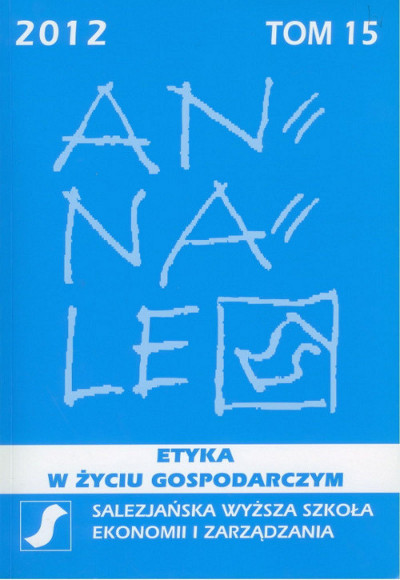Koncepcja człowieka a pozytywny porządek świata
DOI:
https://doi.org/10.18778/1899-2226.15.06Słowa kluczowe:
economic crisis, Church, natural law, God’s law, social conflict, Decaloque, social questionAbstrakt
Looking at the modern events shouldn't we claim that it is impossible to create the positive order of the world there where the human souls are running wild? This strict but at the same time full of realism statement of the Head of the Catholic Church taken from the encyclical on the Christian hope has often appeared in the social teaching of the Church in the recent years, it is repeated in a different form during the Benedict XVI's meetings with the high and mighty of this world and the faithful. This „decline of the souls” is the first reason for the economic crisis. It is a challenge which must be faced by the goodwill people. The rejection of the natural law and the God's law expressed in the Decalogue does not make a human being happier but it introduces divisions, social conflicts and the exploitation. Therefore, the moral revival of people and societies, the respect for human dignity and people's natural rights must go hand in hand with the wise political and economic activities in order to solve the modern „social issue”. Without the moral revival, all other solutions, which can be expected looking for example, at the Polish political scene after the last election, sooner or later will turn against the human being and will cause the irretrievable social damage.
Bibliografia
Calvez Y.J., L’économie, l’homme, la société, D.D.B., Paris 1992, Desclée de Brouwer.
Google Scholar
Chabot L., Question sociale [w:] La doctrine sociale de l’Eglise, P.U.F., Paris 1989.
Google Scholar
Fel S., Prawa człowieka – rozwój idei, podstawa, treść i ochrona, [w:] Katolicka nauka społeczna. Podstawowe zagadnienia z życia społecznego i politycznego, red. S. Fel, J. Kupny, Księgarnia św. Jacka, Katowice 2007.
Google Scholar
Klose A., Die Katolische Soziallehre, Graz–Wien–Koln 1979.
Google Scholar
Kompendium nauki społecznej Kościoła, „Jedność”, Kielce 2005, nr 76–78.
Google Scholar
Leon XIII, Rerum novarum.
Google Scholar
Mazur J., Liberalizm [w:] Encyklopedia nauczania społecznego Jana Pawła II, red. A. Zwoliński, Polskie Wydaw. Encyklopedyczne „Polwen”, Radom 2003.
Google Scholar
Mazurek J.F., Godność osoby ludzkiej podstawą praw człowieka, Lublin 2001.
Google Scholar
Naudet Y.J., La liberté pour quoi faire. Centesimus annus et l’économie, Editions Mame 1992.
Google Scholar
Novak M., Une étique économique. Les valeurs de l’économie de marché, Cerf Institut La Boétie, Paris 2008.
Google Scholar
Piwowarski W., ABC katolickiej nauki społecznej, Wydawnictwo Diecezjalne, Pelplin 1993.
Google Scholar
Rollet J.E., B. Steck, Des idées chrétiennes pour la société, Desclée de Brouwer.
Google Scholar
Rollet J.E., B. Steck, Des idées chrétiennes pour la société, Desclée de Brouwer.
Google Scholar
Strzeszewski Cz., Rozwój koncepcji „kwestii społecznej” i dróg jej rozwiązywania w nauce Kościoła od Leona XIII do Jana Pawła II, „Colloqium salutis” 1982, vol. 14.
Google Scholar
Szlachta B., Indywidualizm [w:] Słownik społeczny, red. B. Szlachta, Wydawnictwo WAM, Kraków 2004.
Google Scholar
Van Rompuy H., Une économie au service de l’homme [w:] Un développement humain integral. La penséee sociale de Benoit XVI dans l’Encyclique Caritas in veritate, Edition Fidelité, Namur 2010.
Google Scholar
Pobrania
Opublikowane
Jak cytować
Numer
Dział
Licencja

Utwór dostępny jest na licencji Creative Commons Uznanie autorstwa – Użycie niekomercyjne – Bez utworów zależnych 4.0 Międzynarodowe.









